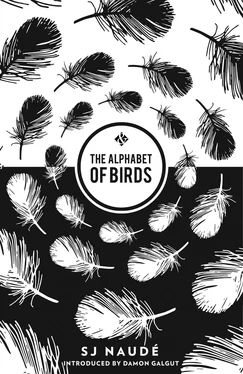Afterwards they — or, rather, Thierry and Nungi — finished off several bottles of Algerian and Lebanese red wine in an over-lit restaurant.
Thierry was as pleased as Punch. ‘Everyone thinks you’re highly original,’ he said, ‘an act for our time. Provoquant . Tongue-in-cheek. Political correctness’s nemesis.’
She and Beauty were absent though present. When the waiters started stacking chairs on tables around them, Thierry and Nungi still sat right up against each other, smoking. A bleary-eyed Nungi snorted some lines with Thierry, just there, off the table, in front of the waiters, his hand on her leg. Thierry’s face showed no expression when Ondien got up and walked out.
At four in the morning, Ondien’s phone rang. Beauty was in the intensive care unit in the Pitié-Salpêtrière hospital. The call was from the hospital. Thierry had left Ondien’s number with the staff and disappeared without a trace.
‘Motorbike,’ the matron said when Ondien had at last found the right wing. ‘Rue Jean-Macé. Almost every bone.’ She shook her head, paging through the file notes. ‘The nose, cheekbone, ribs, pelvis, femur, foot.’ The matron was a fat woman, her own bones comfortably cushioned against shattering.
‘A bunch of nasty fractures. Bones penetrating through skin, dislocations. They’re putting her back together with steel.’ The woman gestured as if she was hitting a chisel with a hammer. ‘She will be in the operating theatre for quite some time.’
While Beauty was in surgery, Ondien waited. The matron sat with her for a while in the bright corridor, legs spread apart, spongy little hands folded across her stomach. She was wearing white stockings and white men’s shoes with rubber soles. She told Ondien how, before the revolution, the hospital had served as a prison for Paris’s prostitutes. The women were locked up, then coerced to pair off with convicts and sent to French-colonial North America. Until, that is, the masses from the pest-ridden sewer of Faubourg Saint-Marcel came to forcefully liberate them.
‘If I had lived then,’ the matron said while getting up and walking away, ‘I would probably have been one of the liberating masses. Or, perhaps,’ she said gigglingly over her shoulder, ‘one of the prostitutes.’
When she arrived back at her flat in the eighteenth, Beauty having been transferred from the operating theatre to intensive care, Nungi was packing.
‘If you’re heading to the Marais, you’re making a big mistake, Nungi.’
‘Always the madam, hey? Always wants to keep the best for herself!’
Ondien was speechless. She could not even ask what exactly had happened to Beauty. Nungi stormed out, cracked suitcase in hand, and then, after a few seconds, returned for her Zulu costume on the drying rack before slamming the door behind her.
For three weeks, Beauty was in the Pitié-Salpêtrière. Apart from the broken bones, there were internal injuries, bruised organs. She was reluctant initially, but then came out with the story: the three of them outside the restaurant, Thierry wanting to take both of them home with him, Beauty refusing, and not wanting to leave Nungi alone with Thierry either; Nungi brusquely pushing Beauty aside, Thierry pushing Beauty against a backyard wall, tearing off her underwear. Nungi looking on impassively. Beauty running blindly into the street.
It was the beginning of winter. Nungi was now living with Thierry. When Beauty was discharged from hospital three weeks after the accident, Thierry locked Ondien and Beauty out in the cold. Literally and figuratively. The lock to the flat in the eighteenth was replaced, with most of their possessions still inside. The incestuous little world of ethnic music in Paris shut them out overnight. No one booked VNLS any more. Perhaps they would still be able to play at one of the annual festivals, or maybe Ondien could get in touch with her contacts in London again, but Nungi was gone and she and Beauty had nowhere to live, and little money left. Le Cap de Bonne-Espérance it was to be, on the cheapest flight they could find.
Shortly before their plane departed, a sullen Nungi arrived at Charles de Gaulle. It was Beauty who had told her that they were leaving. Nungi and Ondien had not exchanged a word in weeks. They embraced Nungi. First Beauty, but in her new, timid manner, as if she was scared the bones would break again in the same places. Then Ondien, her hands cupping Nungi’s cheeks, their foreheads touching for a moment. Ondien took the cracked suitcase and carried it for her.
In Cape Town it is summer, Ondien thought when she sank back in the aeroplane seat, the other two to her right and left, their forearms against hers.
The Land Rover comes to a halt. She must have dozed off. The little dog has crawled onto her lap. Half-past two. In the darkness and cold, holding a small torch, Hendrik leads them to a building. Inside he lights a candle. Above them is a low corrugated-iron roof. It is colder inside than outside. Between the stone walls, sleeping bags have been rolled out onto three iron beds, as if specially prepared for them. Hendrik disappears in the dark, returns after a while with a paraffin heater. Beauty and Nungi sit upright next to each other on a bed. Hendrik smells of engines and red grass. It puts Ondien at ease: smells from her childhood days on the Free State farm.
She is blind here in Hendrik’s place after the sharp morning light outside. His house is half a kilometre down the slope from the outbuilding where they are sleeping, and surrounded by a plateau of blonde grass, dotted with sandstone rocks. It is similar to their building — sandstone and corrugated iron — but it’s much larger, having clearly been expanded in a piecemeal fashion. She walks in behind Hendrik, and straight into his back.
Her eyes have now adjusted. She is still half-frozen after her cold morning shower. She has in fact not warmed up since their arrival the previous night, the lacklustre little paraffin heater notwithstanding. A shaft of light falls in from a back room.
Tools and parts hang from every inch of the walls and ceilings. She sits down on a camping chair, the smell of oil and grease surrounding them.
‘What is all of this? What do you do here?’
His face opens up, he smiles with perfect teeth. ‘Live,’ he says, ‘and work. Fix things, build machines.’
It is not clear where his living space ends and the workshop begins. To her side, by the front door, there is a single bed and a hearth, a little cupboard. On the other side, there are workbenches with vice clamps, iron tools hanging everywhere.
‘Come and see,’ he says.
They walk further in, past the workbenches, through the beam of light, through various dim rooms. He steers her by the elbow, past rotors and tubes, oil filters and engines. A collection of iron and rubber and screws and tins are stacked on shelves.
‘How do you know where to find things?’
‘Everything is where I put it. I’m here alone.’
‘So, what are you building?’
‘Different things. I buy appliances that are thrown out in South Africa — washing machines, radios, televisions. Sometimes cars. Then I fix them up and sell them here. It’s my business. Rest of the stuff’s just a hobby.’
She loses track of the number of rooms. A few doors remain closed. They walk out into a backyard with a lean-to supported by poles. Underneath it is a row of rusty vehicles on flat tyres or wooden blocks.
‘So, you’re carrying the torch of technology. Seems to me you’re a kind of modern missionary here among the Basothos.’
He smiles. When he turns around, she notices sweat starting to soak through the back of his khaki shirt, despite the cold.
She turns around and starts. The barrel of a cannon stares her in the face. A row of old tanks on caterpillar wheels stand under a second lean-to.
Читать дальше












